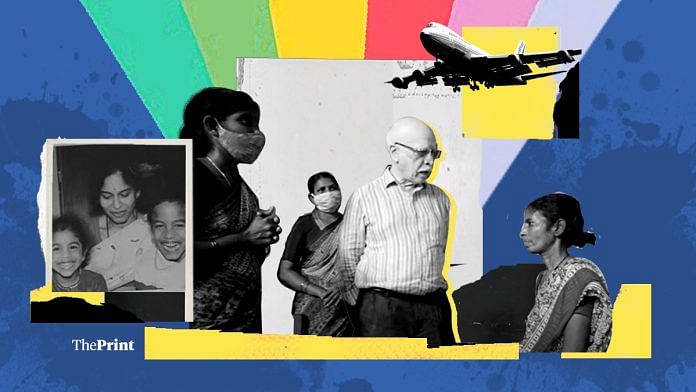New Delhi: Dr Sankurathri Chandrasekhar, 79, lost his wife and two children in the 1985 Kanishka bombing. Within three years of the tragedy, the Canada-based Padma Shri awardee returned to Andhra Pradesh and started a charitable organisation in his wife’s village, Kakinada. Through the Sankurathri Foundation, he dedicated his life to helping people and never looked back.
As he sits in his living room for an interview with ThePrint via Zoom, Dr Sankurathri ensures that a photograph of his wife, Manjari, is visible. It is his life’s work as a social worker through which he honours her memory, and that of his six-year-old son Srikiran and three-year-old daughter Sarada.
“I never wanted anything in return for my work,” he says, “but when people visit our compound and bow down to the statues of my wife and children, I feel blessed, and feel my family is also blessed.”
The Sankurathri Foundation has helped educate at least 4,500 children and provided equitable access to eye care in rural and tribal districts of Andhra Pradesh. The organisation has worked towards stopping child marriages and assisted in natural disaster relief work as well, he says.
India-Canada relations soured drastically following Prime Minister Justin Trudeau’s claims that there was credible intelligence linking Indian agents to the killing of Sikh extremist Hardeep Singh Nijjar. Denying the charge, India has said it is open to looking at “specific” information. The row has resulted in tit-for-tat expulsions of diplomats, visa bans, and reduction of staff at high commissions.
Amid the diplomatic row, the 1985 Kanishka bombing, where Air India Flight 182 (Montreal-Mumbai) suffered a mid-air explosion over the Atlantic Ocean, killing all 329 people on board, also returned to national conversation. The 38-year-old wounds were fresh again, as the row once again put the spotlight on Canadian intelligence overlooking signs of an impending attack, and refusing to extradite Sikh separatist Talwinder Singh Parmar in 1982. Parmar is considered the mastermind of the bomb blasts.
In a previous interview with ThePrint, Canadian journalist Terry Milewski, and author of the book ‘Blood for Blood — Fifty Years of the Global Khalistan Project’ also expressed anguish over the fact that Parmar is today celebrated in posters outside gurdwaras in Canada.
But it’s not something that bothers Dr Sankurathri, as he has “moved on”. His “focus on his work” has kept him going. “I don’t know anything about it. I stopped following the case long ago, I stopped asking questions long ago. The mission I have found in life has given me purpose and I wish to focus on it,” he says.
Also read: ‘Important US has accurate picture’: Jaishankar confirms he discussed India-Canada row with Blinken
‘Canada my first home’
Though Dr Sankurathri moved back to India in 1988 in search of a higher meaning and purpose, he still considers Canada to be his “first home”.
“My foundation wouldn’t have been possible without the help of my Canadian friends who helped establish it,” he says. “I have lived in many parts of Canada and have even found mentors there. Canadian citizens from the East to West coast helped the Sankurathri Foundation stand on its feet. Even the Padma Shri award wouldn’t have been possible without the constant help of my Canadian friends.”
He also doesn’t speak on the Indian government’s stand that Canada is harbouring separatist sentiments as he doesn’t wish to comment on politics. But one of the lasting legacies Dr Sankurathri wants to leave behind is a ‘garden of peace’ for India and Canada. “The whole world should work towards peace and harmony. I am making a Canada-India peace garden in the compound, celebrating friendship among the two nations. That’s what I want to do before I pass.”
(Edited by Smriti Sinha)
Also read: Trudeau’s ‘diversion tactic’, Western ‘hypocrisy’, Modi cartoons — global media on India-Canada row



